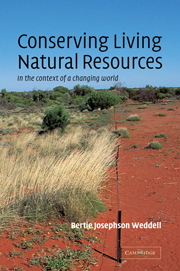Book contents
- Frontmatter
- Contents
- Preface
- Introduction: Balance and flux
- Methodology: Getting the information we need to manage living natural resources
- Part I Management to maximize production of featured species – a utilitarian approach to conservation
- Part II Protection and restoration of populations and habitats – a preservationist approach to conservation
- Part III Management to maintain processes and structures – a sustainable-ecosystem approach to conservation
- Postscript
- Appendix: Scientific names of organisms mentioned in the text
- Index
Postscript
Published online by Cambridge University Press: 05 June 2012
- Frontmatter
- Contents
- Preface
- Introduction: Balance and flux
- Methodology: Getting the information we need to manage living natural resources
- Part I Management to maximize production of featured species – a utilitarian approach to conservation
- Part II Protection and restoration of populations and habitats – a preservationist approach to conservation
- Part III Management to maintain processes and structures – a sustainable-ecosystem approach to conservation
- Postscript
- Appendix: Scientific names of organisms mentioned in the text
- Index
Summary
Each of the three types of natural resource management considered in this book – utilitarian, preservationist, and sustainable-ecosystem management – can make unique contributions to solving practical problems. Each has advantages and disadvantages, and each is appropriate in certain situations. In many cases elements from more than one approach can be blended.
I believe that the flux-of-nature viewpoint is a valuable contribution and that managing ecosystems to preserve their complexity is an exciting new development. But I also believe that as we continue to search for responsible ways to manage living natural resources, a large dose of humility is appropriate. Science, whether theoretical or applied, is an ongoing process. Just as the flux-of-nature viewpoint encompasses certain observations that did not fit comfortably into equilibrium explanations, it is likely that this perspective has limitations that are not obvious at present. Although our understanding of the natural world is more detailed than it used to be, there is still a lot we do not know. Management should err on the side of caution, therefore. There will always be surprises.
- Type
- Chapter
- Information
- Conserving Living Natural ResourcesIn the Context of a Changing World, pp. 396 - 397Publisher: Cambridge University PressPrint publication year: 2002



